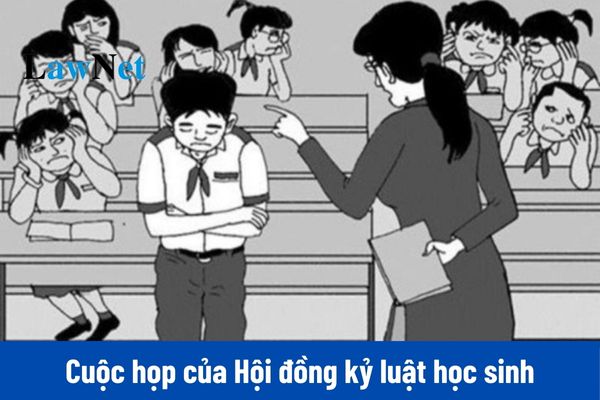Are teachers in Vietnam allowed to attend meetings of the student disciplinary council?
Are teachers in Vietnam allowed to attend meetings of the student disciplinary council?
Under point b, clause 2, Article 29 of the Charter of Lower Secondary Schools, Upper Secondary Schools, and Multi-level Schools issued in conjunction with Circular 32/2020/TT-BGDDT, the regulations are as follows:
Rights of teachers and staff
...
2. Rights of homeroom teachers besides those provided for in Clause 1 herein:
a) Join other classes and educational activities involving their charges.
b) Attend meetings of the reward council and disciplinary council upon handling of matters concerning their charges.
...
Thus, homeroom teachers are allowed to attend meetings of the student disciplinary council upon handling of matters concerning their charges.

Are teachers in Vietnam allowed to attend meetings of the student disciplinary council? (Image from Internet)
Who does the student disciplinary council in Vietnam include?
Under point a, clause 2, Article 12 of the Charter of Lower Secondary Schools, Upper Secondary Schools, and Multi-level Schools issued in conjunction with Circular 32/2020/TT-BGDDT, the regulations are as follows:
Other councils in secondary schools
...
2. Disciplinary councils
a) The student disciplinary council shall be established to consider or lift disciplinary sanctions imposed upon students on a case-by-case basis. The principal has the power to issue decision on establishment of the student disciplinary council and lead this council. Members of the council include deputy principal(s), secretary of the Ho Chi Minh Communist Youth Union (if any), leader of the Ho Chi Minh Young Pioneer Organization (if any), homeroom teacher of the misbehaving student’s class, some teachers with experience in correcting misbehaving students and head of the parent committee of the school.
...
Thus, the members of the student disciplinary council include:
- deputy principal(s),
- secretary of the Ho Chi Minh Communist Youth Union (if any),
- leader of the Ho Chi Minh Young Pioneer Organization (if any),
- homeroom teacher of the misbehaving student’s class,
- some teachers with experience in correcting misbehaving students and
- head of the parent committee of the school
What are the general provisions on the school council of a public secondary school in Vietnam?
According to clause 1, Article 10 of the Charter of Lower Secondary Schools, Upper Secondary Schools, and Multi-level Schools issued in conjunction with Circular 32/2020/TT-BGDDT, the general provisions on the school council of a public secondary school in Vietnam are as follows:
- The school council of a public secondary school shall manage the school, exercise the right of ownership representation of the school and relevant interested parties, decide the school’s operational direction, mobilize and supervise use of resources for the school, link the school with the community and society, and ensure the realization of educational objectives.
- The school shall be composed of the secretary of the Party Executive Committee; school principal; chairperson of trade union; secretary of the Ho Chi Minh Communist Youth Union, representatives of specialized teams and office team; and representatives of the local government, parent committees and students.
The school council shall have a chairperson, a secretary and other members, and an odd number of members between 07 and 15. The council’s tenure shall be 05 years.
- The school council shall have the following duties and powers: decide the school’s development objectives, plans, vision and strategies, projects for each period of time and each year; decide the school’s organizational and operational regulations or amendments thereof, which shall be proposed to the competent authority for approval; decide guidelines for use of the school’s funding and property; approve the school’s education plan; supervise admission and organization of activities included in the school’s education plan; supervise implementation of the school council’s decisions and democracy practice in the school; and supervise mobilization, management and use of the school’s resources in compliance with the law.
- Operation of the school council:
The school council shall convene at least three times a year. Where necessary and at the request of the principal or at least one third of the council members, the council chairperson has the right to convene an irregular meeting to resolve issues arising while the school fulfills its duties and exercises its rights. The council may hold a meeting by requesting written opinions. The council may invite representatives of other groups of people to a meeting if necessary. A meeting session shall be recognized as valid when at least three fourths of the council members attend (including the council chairperson). A decision by the school council shall be passed and come into force with the approval of at least two thirds of the present members. Decisions issued by the school council shall be announced publicly.

